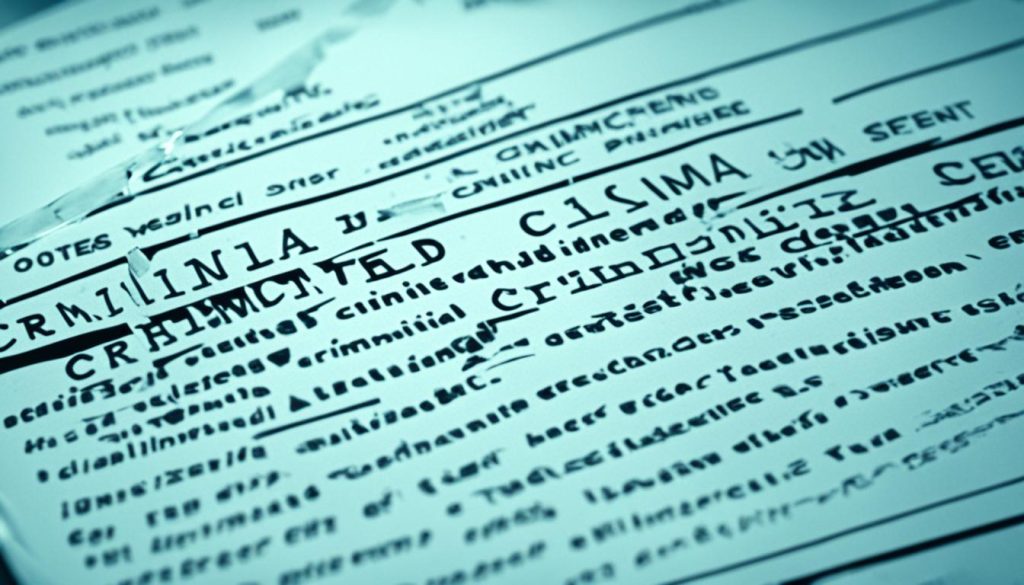Getting charged with assault and battery can affect more than just your legal status. It can also impact your job chances and personal life. These charges, from minor to serious, can change your future a lot1. It’s important to know how to handle these charges to keep your options open.
Employers see assault and battery charges as a warning sign. They worry about your trustworthiness and if you might be violent2. Many jobs ask about your criminal past, including these charges1. The seriousness of the crime can lead to fines, probation, or even jail time3. This can make it hard to find a job, especially in jobs that need trust and security clearances1.
Key Takeaways
- Assault and battery charges can range from misdemeanors to felonies, with varying legal and employment consequences.
- Job applications often require disclosure of criminal history, including assault and battery charges and convictions.
- Employers may be particularly unforgiving towards individuals with assault and battery charges, especially in industries focused on trust and integrity.
- Rehabilitation, community service, and expungement can potentially improve employment prospects.
- Skilled legal representation is crucial in navigating the complexities of assault and battery charges and their impact on your record.
Understanding Assault and Battery Charges
Dealing with assault and battery charges is complex and important. These crimes can affect you in big ways, socially and legally. Let’s look at the main differences between assault and battery.
Differentiating Battery from Related Charges
Assault and battery are different but linked crimes. Assault is about threatening violence, while battery is about actual physical contact. Assault is making someone fear you’ll hurt them soon, and battery is hitting or touching someone without their okay.4
Charges for assault and battery can be serious, from misdemeanors to felonies. First-degree assault can cause serious injuries that might even be life-threatening.4 The state must prove you did it with no doubt. Second-degree assault is less severe but still serious, with injuries that aren’t life-threatening.4 This charge comes from being reckless or taking risks. Third-degree assault is the least serious and might be a misdemeanor.4 Judges can be lenient with this charge, possibly giving you probation or little jail time4.
Using a weapon makes assault charges worse because it increases the risk of serious injury4. How serious the charge is can depend on the laws where you live.4 Trying to assault someone is also a crime and can lead to serious legal trouble4. Even just threatening someone can be seen as assault if it’s clear and believable.4
Knowing the difference between assault and battery is key to handling legal issues well. Getting a lawyer is a smart move to understand the risks and plan your defense4.
The Impact of Assault and Battery Charges on Your Record
Assault and battery charges can greatly affect your life, leaving a lasting mark on your criminal record. This can impact your future in many areas, such as getting a job, going to college, finding a place to live, and keeping professional licenses and security clearances5.
In New York State, having an assault conviction can limit your career choices. Certain jobs like law enforcement, healthcare, and finance have strict rules for people with criminal records5. Schools and colleges check your background, which could affect your admission and access to financial aid and housing5. Finding a place to live can also be hard because landlords often check your background, which might lead to being turned down or having fewer options5.
Being convicted of assault or battery can also affect your social life. You might face social stigma, leading to problems with personal relationships and feeling isolated in your community5. The financial side is tough too, with legal costs, fines, and fewer job options causing financial stress5.
In New York State, an assault conviction can take away some civil rights, like voting, serving on a jury, or owning a gun5. It can also affect your family life, with courts looking at your criminal record when deciding on custody and visitation rights5. For non-U.S. citizens, assault charges can lead to serious immigration issues, like deportation or being denied visas5.
Understanding how assault and battery charges can affect your life is key. It impacts everything from getting a job and a place to live to your rights and family life5. Getting through the legal system and reducing the effects of these charges needs help from a skilled criminal defense lawyer6.
Simple assault or battery is usually a misdemeanor, with a top punishment of a year in jail and probation6. But, if the situation is more serious, the charges can be more severe, leading to longer prison time, longer probation, and bigger fines6. Things like using harmful chemicals, dangerous weapons, or guns can make the charges worse6.
Assault and battery charges can also lead to civil lawsuits from the people you allegedly hurt, with a lower standard of proof needed6. You might have defenses like self-defense, false claims, or not acting on purpose, but it’s important to know how to handle the legal system6.
The effects of assault and battery charges go way beyond the legal outcome7. With the right legal advice and understanding the possible outcomes, you can better handle the challenges and aim for a better future7.
“A criminal record from assault or battery charges can lead to difficulties in finding employment, and the burden of proof in civil lawsuits related to these charges is lower than in criminal cases.”6
Social Consequences of Battery Charges
Being accused or convicted of battery can affect more than just the legal system. The social effects of making illegal physical contact can be big and last a long time8. You might face damage to your reputation, problems in personal relationships, and losing your job or future job chances8.
The social stigma from battery charges is hard to shake off. It can hurt your professional image, making it tough to get or keep a job8. This can greatly affect your money situation and your career future8.
Your personal life may also be affected by the emotional toll of the charges. Family, friends, and partners might find it hard to trust you again, causing stress on your relationships8. It’s important to seek emotional support and think deeply about your actions during this tough time.
To deal with the social effects of battery charges, you need to take action. Working with a therapist or counselor can help you deal with the emotional side and find ways to fix your reputation and relationships8. Being open and taking responsibility for what you did is also key to healing.
“The social consequences of battery charges can be just as daunting as the legal ones. Rebuilding your life and reputation after such an incident requires immense personal resilience and support.”
Remember, the social challenges you’re facing don’t define who you are. With the right support and a dedication to growing personally, you can move past this and take back control of your life8.

Legal Consequences and Navigating the System
Battery charges have big legal effects. They can affect your criminal record, the fines you might get, and your future job or home search9. In South Carolina, these charges often come from domestic violence, like hurting someone you know or threatening them9. The state has different types of assault charges, each with its own set of penalties9.
Recognizing the Legal Consequences
In California, battery charges are misdemeanors. If you’re found guilty, you could face fines and even jail time9. In South Carolina, the penalties for assault can range from fines and community service to up to 30 days in jail for simple assault9. For more serious cases, you could face fines and imprisonment for years or even decades9.
Having a criminal record can make it hard to get a job or a place to live. Many employers and landlords check your background10. A conviction for 2nd Degree Aggravated Assault can lead to fines, probation, and even jail time of over a decade10. For people not from the U.S., such a conviction could mean being deported or banned from entering the country10.
There are ways to defend against 2nd Degree Aggravated Assault charges. You could argue you were acting in self-defense, that you were provoked, or that you didn’t mean to cause harm10. The prosecution must prove you intended to cause serious harm and that the injury was severe10. You might be able to get your charges reduced or defended by a lawyer10.
In Virginia, assault and battery are misdemeanors, which means the penalties are less severe than felonies11. These charges can lead to fines, probation, or even jail time11. Examples of these charges include fighting, disorderly conduct, or possessing marijuana11. The seriousness of the punishment depends on the crime, your criminal history, and other factors11.
Getting a lawyer is key when facing battery charges. They can help you understand the legal process and find ways to lessen the impact10. A criminal record from battery can affect your job, home, and life in many ways11.

Conclusion
Dealing with the social and legal effects of assault and battery charges needs a deep understanding and a proactive plan12. The seriousness of the charges can affect your job, where you live, and your overall life quality13. Getting expungement, showing you’ve changed, and finding good legal help are key to lessening these effects and keeping your future safe14.
Knowing about assault and battery charges and the ways to defend yourself can help you move forward14. Whether it’s a minor or serious charge, you need a smart plan to protect your rights and lessen the long-term effects on your life12.
Being proactive and getting advice from experts can lead to a good outcome and help you feel confident about your future13. The process might be tough, but understanding the details of assault and battery charges and the ways to deal with them can make you stronger. This way, you’re ready to face the challenges ahead.
FAQ
How can assault and battery charges impact my record and employment prospects?
Assault and battery charges can greatly affect your job chances. The type of charge, like a misdemeanor or felony, decides the legal and job impacts. These can include losing your job and limiting your career options. To lessen these effects, you might seek to have your record cleared, show you’ve changed, or get legal help.
What is the difference between battery and related charges?
Battery is when you touch someone without their okay. It’s a crime that can lead to fines, community work, or even jail. Having a battery conviction can also hurt your chances of getting a job or a place to live in the future.
How can assault and battery charges impact my record and future prospects?
Being convicted of assault or battery can really affect your future. It can make it hard to get a job or keep one. Jobs that need trust, like in healthcare or law enforcement, might be especially tough to get with a record like this. It’s important to know how to deal with these challenges.
What are the social consequences of battery charges?
Being accused or convicted of battery can really hurt your social life. It can damage your reputation, hurt your relationships, and make it hard to find a job. It’s important to deal with these issues and get help to get through this tough time.
What are the legal consequences of battery charges?
Battery charges have serious legal effects. They can affect your criminal record and your job or housing chances. In California, battery is a misdemeanor, which means fines and possibly jail time. Having a criminal record can make it hard to find a job or a place to live because many employers and landlords check your background.
Source Links
- The Impact of Assault and Battery Charges on Employment and Background Checks: What You Should Know – Defense Law Utah
- Domestic Assault and Battery: Understanding the Impact on Employment – Michael Patrick Murray Defense
- Navigating the Social and Legal Consequences of Battery Charges
- Understanding the Different Degrees of Assault – Spangler Law
- The Long-Term Consequences of an Assault Conviction on Your Record in New York State
- Assault vs Battery – Are they the same or different crimes?
- Assault & Battery – Right Choice Law
- What is the Difference Between Assault and Battery | Innovate Criminal Defense Lawyers
- Understanding Assault Charges SC | Help Available 24×7
- Understanding 2nd Degree Aggravated Assault: Legal Insights and Relief Options – Criminal Immigration Lawyer
- Understanding the Consequences of Misdemeanor Convictions in Virginia
- THE DIFFERENCE BETWEEN ASSAULT AND BATTERY – Malcolm Anthony, P.A.
- Assault and Battery Case Defense Consulting Services – Konstantakis Law Office, LLC
- McCormack & McCormack

